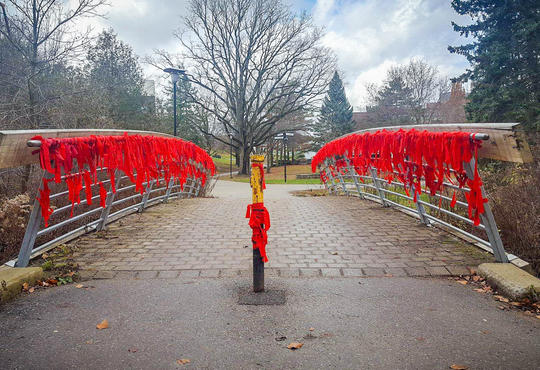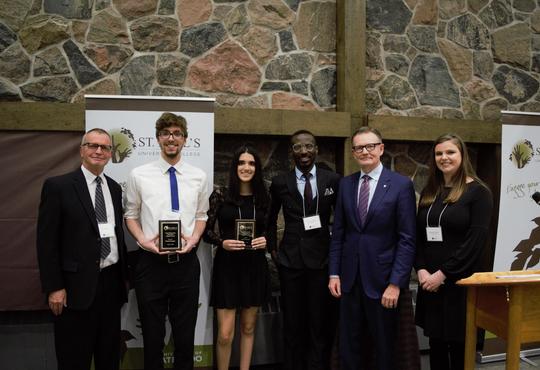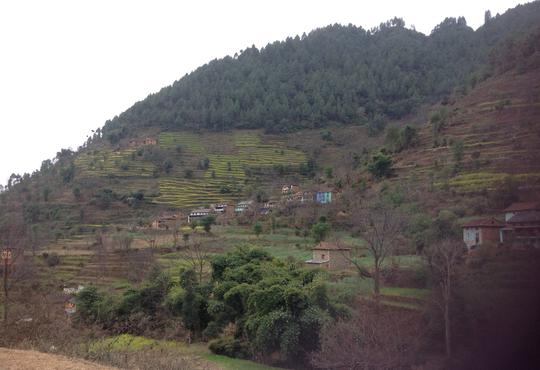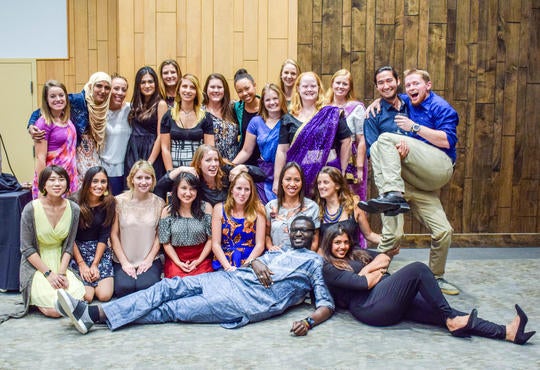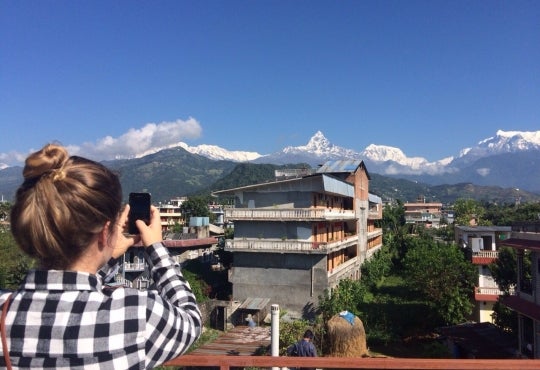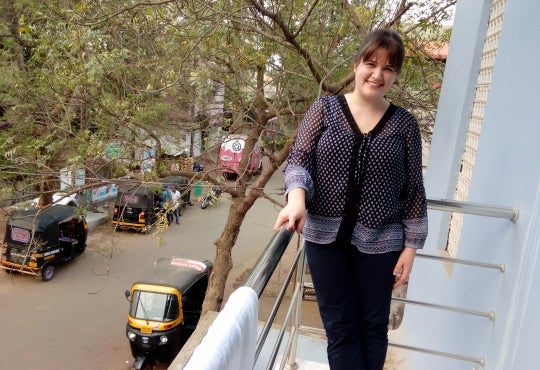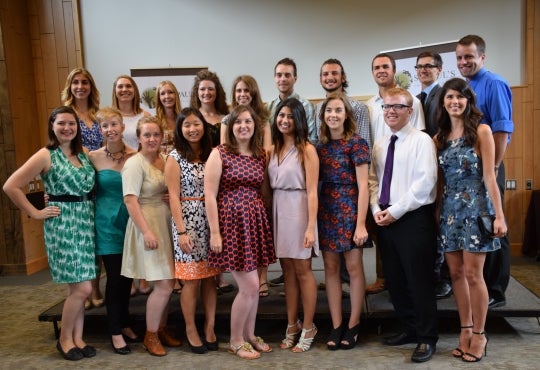INDEV PROF RECOGNIZED WITH 2018 DISTINGUISHED TEACHER AWARD
Congratulations are in order for our very own Julia (Julie Kate) Seirlis, Continuing Lecturer in International Development, who is one of this year’s winners of the University of Waterloo’s Distinguished Teacher Award.
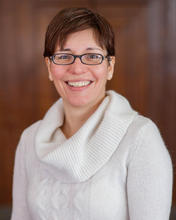 Established in 1975, the Award is given each year to four “exemplary instructors” nominated by students and/or colleagues for their intellectual vigor, their agility in conveying subject matter, their impact beyond the classroom, and their concern for the needs of students.
Established in 1975, the Award is given each year to four “exemplary instructors” nominated by students and/or colleagues for their intellectual vigor, their agility in conveying subject matter, their impact beyond the classroom, and their concern for the needs of students.
Julie Kate was nominated for challenging students to go further and deeper, for her desire to produce critical thinkers, and for encouraging students to ask difficult questions of those in power.
Students note that “she has been a consistent voice of support, has connected us to many valuable contacts, and has encouraged us to bring our work into the academic sphere.” An alumnus who wrote in support of the nomination said, “I was able to look back and see that she had led us on a brilliant learning journey.”
Julie Kate is a Greek-Zimbabwean immigrant to Canada and joined St. Paul’s and International Development in 2013. She holds a BA in English, French, Italian, Latin and Private Law from the University of Cape Town and an MSt and DPhil in Social and Cultural Anthropology from the University of Oxford. Her doctorate examined the relationships between race and space in the construction – and alienation – of Coloured identities in Rhodesia and Zimbabwe. After three years of development work in Zimbabwe as a researcher and writer, a human rights program officer, and an adviser on gender equity and children’s rights, Dr. Seirlis lectured in anthropology at the University of the Witwatersrand in Johannesburg, South Africa, between 2002 and 2005. In 2006, she was commissioned by the Electoral Institute for Sustainable Democracy, then EISA, to write a book marking the 10th anniversary of the organisation and its work on elections and democratisation in Africa. The book, Walking a Tightrope, was published in October 2008.
Her research at St. Paul’s and the University of Waterloo focuses on the ethics and politics of teaching international development and on pedagogy as activism. She will be teaching in St Paul’s new minor in Indigenous Studies beginning this Fall.
Julie Kate was previously nominated for a Distinguished Teacher Award in 2015. She, along with Wayne Chang (Engineering, Conrad Centre for Business, Entrepreneurship and Technology), Shannon Dea (Philosophy, Arts) and Jake Fisher (Chemistry, Science), will receive the award at Convocation on June 12th 2018.
UNITY IS FORCE
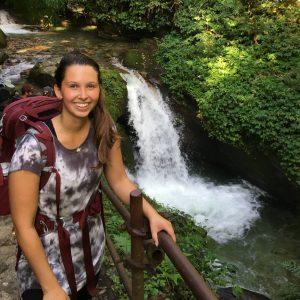 Jaime Crncich (INDEV ’18) completed her field placement in Nepal as a Marketing and Promotion Intern with the Coffee Cooperative Union Lalitpur (CCUL) This blog post from November 5, 2017 was originally posted on volunteer-blog.ca
Jaime Crncich (INDEV ’18) completed her field placement in Nepal as a Marketing and Promotion Intern with the Coffee Cooperative Union Lalitpur (CCUL) This blog post from November 5, 2017 was originally posted on volunteer-blog.ca
“To walk together is better than to walk alone” is the simple answer I get from Shyam Prasad Adhikari, treasurer of the Durlung Jaibik Coffee Producer Cooperative, when I ask him what advantages he sees from being a member of a cooperative.
“Unity is force. To be a member of a cooperative is a strong relationship between farmers and neighbours.”
For Mithram and Menuka Sapkota, a couple who have been farming coffee for 14 years, they appreciate the cooperative membership for their access to low interest small loans from a collected 100-rupee savings from each farmer per month.
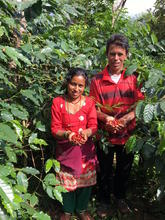 All of them agree that the cooperative’s principles of non-discrimination (based on caste, religion, gender, etc.) has increased the positive thinking and attitude towards one another within their community. In a community still reeling and rebuilding from the damages of the 2015 earthquake, this solidarity has been essential.
All of them agree that the cooperative’s principles of non-discrimination (based on caste, religion, gender, etc.) has increased the positive thinking and attitude towards one another within their community. In a community still reeling and rebuilding from the damages of the 2015 earthquake, this solidarity has been essential.
The cooperative model is used widely throughout Nepal, and members of our coffee cooperatives are commonly members of other cooperatives as well (dairy, forest user groups, etc.). But even outside of formal cooperatives, I have witnessed that cooperation is valued highly in all dealings and relations. This applies to the way that I have seen families operate, with responsibility for family members extending beyond the immediate nuclear family as I am used to in Canada, but rather including Aunts and Uncles, and even Grandparent’s siblings. This also applies to community dealings and decisions: my homestay family frequently host members from each household in their neighbourhood to discuss important topics such as community water management.
When asked what types of cooperatives myself and my family are a part of back in Canada, I try to explain the individualistic oriented business model that I have been raised around, which lately makes less sense than it used to. I am embarrassed by the fact that I have come to know more of my Nepali neighbours here in Chapagaun in the last 2 months than I do my own neighbours of over 15 years back in Ontario.
Working for a cooperative union, I have also uncovered many frustrations about this model. Getting the members together for democratic decision making takes months of planning and preparation, drawing out the timelines of projects that could be so straightforward but nonetheless must first be approved by the board. Secondly, without much knowledge of the daily operations of the cooperative or union, members hold the decision making power but without always understanding the full context of the impacts of their decisions. However, although sometimes painfully slow, this democratic process results in educating all farmers on the operations of their cooperative, building their capacity to make effective decisions, rather than making decisions on their behalf which may not fit their needs or desires.
It has been a continual lesson for me here in Nepal that doing things slowly will be far more valuable in the long run if it means doing things right and fairly to facilitate the most benefit to the most people possible.



